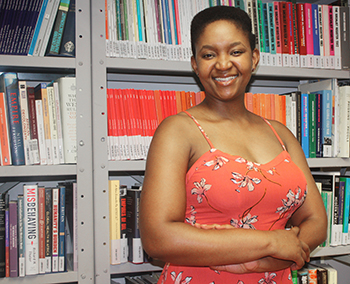UFS postdoctoral Fellow expands international opportunities for women in Science Communication

Mikateko Höppener, postdoctoral Fellow at the
Centre for Research on Higher Education and
Development (CRHED), University of the Free State (UFS),
who was selected as one of five South African women
to participate in the Best Practice in Science
Communication UK study tour.
“Often, the power lies in our own hands as individuals to take the initiative, be curious about opportunities to learn, develop an interest to make a positive contribution in society through our research, and make use of our networks within and outside of academia to effect positive change.”
This is according to Mikateko Höppener, a postdoctoral Fellow at the Centre for Research on Higher Education and Development (CRHED), at the University of the Free State (UFS), who was selected as one of five South African women to participate in the Best Practice in Science Communication UK study tour. This was part of the British Council and Academy of Science South Africa (ASSAf) women in science project.
Höppener said she saw this as an opportunity to expand opportunities for women in Science, Technology, Engineering and Mathematics (STEM). “The whole experience reinforced my conviction that there is a lot of untapped potential for young people to practise and enhance science communication in South Africa for the betterment of our communities,” she said.
During her visit to the UK, Höppener was exposed to an international networking platform of science communication practitioners and stakeholders such as the Director for Development of Vitae, departments at The Royal Society, science journalists at the BBC World Service, policy advisers and public engagement teams at the Welcome Trust, the Director of SciDev.net, and the Science Adviser for STEM Education and Public Engagement at the British Council.
Höppener said each of these meetings had highly interactive presentations and discussions with members of various organisations and the South African delegation.
Being selected for the science communication fellowship and attending the study tour was not only personally and professionally rewarding for Höppener, it also enabled her to pass on what she had learnt to fellow emerging women researchers in South Africa.
Earlier this year, she hosted a WiSTEM (Women in Science, Technology, Engineering and Mathematics) Science Communication and Engagement Workshop at the UFS and through press releases and radio interviews, brought positive attention to the UFS to inspire young women across the country to get involved in science communication training.
“I intend to establish a science communication and engagement centre at the UFS where ongoing training, mentorship and support will be offered to young researchers to learn how to orient their knowledge and research to community development through science communication,” said Höppener.
The Best Practice in Science Communication UK study tour took place from 24 to 28 October 2016 as part of the Newton Fund Professional Development Programme South Africa.